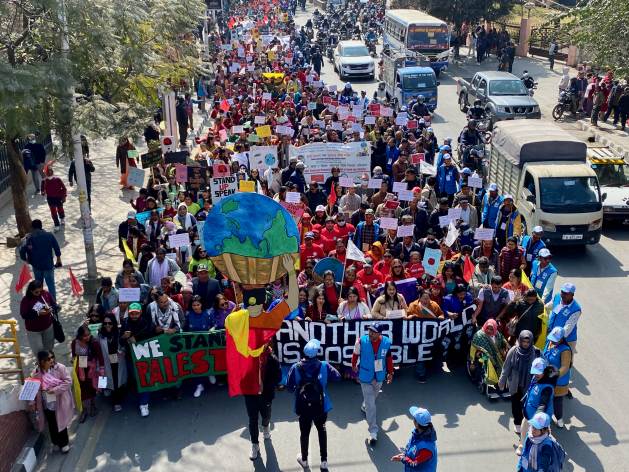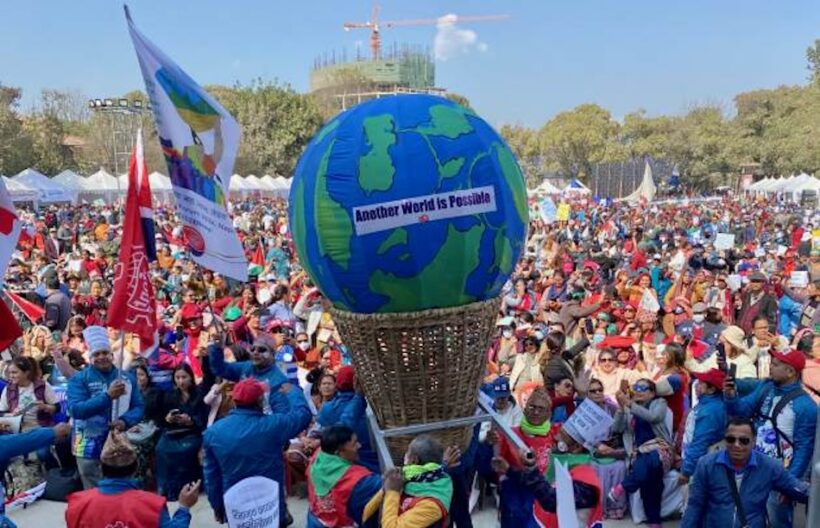These are the worst of times, but they can become the best of times, said speaker Walden Bello, trying to inspire thousands of progressive activists gathered at the World Social Forum (WSF) in Kathmandu on Thursday, 15 February, with the planet under the cloud of armed conflict and attacks on democracy.
“We are facing a climate catastrophe,” Bello continued, after quoting Charles Dickens’ A Tale of Two Cities. “We have neoliberal capitalism, even though it has been proven false in all its assumptions,” added the renowned Filipino academic and defender of the global South.
“We have the global rise of fascism, a fascism that wants to subject one group of people to the domination of another group of people,” Bello told the thousands of people gathered under a hot winter sun in a vast field in the centre of Nepal’s capital.
“What should the WSF Nepal 2024 represent? It should be the affirmation of all of us to save the planet from climate catastrophe and the ravages of capitalism,” he said: Walden Bello.
From Thursday the 15th to Monday the 19th, the Nepalese capital will host a new edition of the WSF, which since 2001 has brought together activists from all over the world under the slogan: “Another world is possible”, with a predominant focus on the global South, in favour of a social and inclusive approach to development, with the ideas of the world’s organised civil society at the centre.
The WSF emerged as a counterpoint to the approach of the World Economic Forum, which brings together the world’s leaders and power brokers every year in the Swiss town of Davos.
The issues at the forefront
“But this could be the best of times, despite the darkness the world is actually in,” Bello said.
The Filipino academic asked: “What should the WSF Nepal 2024 represent? It should be the affirmation of all of us to save the planet from climate catastrophe and the ravages of capitalism.
He continued: “It must mean that we all stand up and risk our bodies against the rise of fascism. And I would say it must mean putting our bodies on the line against genocide.
Other speakers on the opening day of the WSF also referred to the Israeli army’s continued attacks on Palestine.
“In today’s world, where armed conflicts are the order of the day, where mass genocide is being committed with total impunity, we must unite for the people who need it most, the Palestinian people,” said Aleida Guevara, eldest daughter of Argentinean-Cuban revolutionary Ernesto Che Guevara.
“The situation is very difficult, but what are we doing? Nothing, or almost nothing. What is clear is that it is not enough. The Palestinian people are still dying,” she added.
South Africa cannot stand alone in demanding more justice and punishment for those who have become humanity’s worst killers,” he said, referring to the country’s application to the International Court of Justice in January to determine whether Israel is committing genocide in Gaza.

Activists march through Kathmandu on the opening day of the World Social Forum 2024 on 15 February. Image: Marty Logan / IPS
The opening day began with a march through the centre of Kathmandu, a city of some five million people, packed with vehicles.
Some groups carried long banners, while individual demonstrators waved colourful hand-written placards declaring their support for a wide range of issues, from debt relief to the fight against caste discrimination and the rights of sex workers.
Between 30,000 and 50,000 people from more than 90 countries are expected to attend more than 400 workshops, lectures and other events at the WSF, which concludes on Monday 19.
At the opening ceremony, other speakers on the huge stage pointed out that the world’s working poor continue to face attacks on their livelihoods.
Agricultural activist Burry Tunkara from Gambia told delegates: “There is no doubt that agriculture is the largest part of the economy in Africa and the world; smallholder farmers lack formal land rights, making them vulnerable to land grabbing, displacement and exploitation.
“By investing in women and youth, we can unlock the potential of global agriculture and contribute to gender equality and social development,” she added.
The journey since the first WSF in 2001
The first WSF was held in 2001 in Porto Alegre, in the south of Brazil, on the initiative of Brazilian organisations and social movements and in coordination with international groups. But it is a fact that after the glamour of the first years, the forum has declined in recent years.
“So far we are losing the game,” WSF co-founder Obed Grajew told IPS in the Brazilian city of São Paulo. “The climate crisis has worsened, inequalities and conflicts have increased, there is a risk of nuclear war, confidence in democracy is declining and global governance is non-existent. These are huge risks that threaten the human species,” he said.
“WSF 2024 will show that global civil society still has a strong voice,” said Netra Timsina, a member of the forum’s organising committee from Nepal. “There is still a living, vibrant voice speaking out against what is happening: genocide, war, climate catastrophe, populism, inequality,” she added.
The organisers of the WSF in Nepal want to share and protect their gains as a democracy after the end of the Maoist conflict in 2006: “our republic and secular constitution, our peace process and human rights and democracy,” they say.
Ahead of the opening ceremony, IPS spoke to Indian activist Skani Pinto, who has been campaigning for indigenous rights for 40 years.
“We all have equal rights and dignity, so we work for the global family. This is our inner calling; it does not allow us to think otherwise,” he said.










